
The lottery is a form of gambling in which people pay for a chance to win a prize. The prize may be money, goods or services. Lotteries are legal in many countries and are often used as a method of raising funds. Some states have laws against them, while others endorse them and regulate them. The odds of winning vary depending on the size of the jackpot and the number of tickets sold. The prize amount may also be based on how many numbers are correctly matched.
If you want to win the lottery, it’s important to know the rules. You should also learn about how the lottery works and where the money goes. Then, you can make an informed decision about whether or not to play.
In the United States, the federal government operates the national lottery. But each state can offer its own games as well. In some cases, the state and federal governments collaborate on a lottery. Regardless of the type of lottery, it’s important to understand that the prizes are often much lower than advertised. This is why some states limit the amount of money they award.
Lottery winners usually receive a lump sum of cash and cannot keep it all at once. Typically, the winner is required to pay taxes on half of the total amount won. This is why so many people end up going bankrupt within a few years after winning the lottery. In addition to that, there are a lot of hidden fees and taxes involved in the process.
While some people argue that the lottery is a waste of time, it does have its benefits. Several studies have shown that playing the lottery can help with depression, stress and low self-esteem. However, it’s essential to avoid lottery scams and only buy a legitimate ticket.
Aside from the fact that it’s a fun way to spend your spare time, the lottery can also provide you with some extra income. In order to maximize your chances of winning, you should avoid improbable combinations such as 7 and 34. You can also improve your odds by choosing a larger number field or picking smaller numbers such as 32, 35 and 39.
In colonial America, the lottery was a popular method of raising money for public projects. Benjamin Franklin organized a lottery to raise money to purchase cannons for the city of Philadelphia. George Washington managed a lottery to fund the construction of roads and canals in Virginia. In addition, he managed a lottery to give away land and slaves.
The lottery system has been around for centuries and has been a source of great wealth for some. It is a popular way to raise money for a variety of public uses, including infrastructure and education. Its popularity has increased over the years and it continues to grow as players look for ways to boost their chances of winning. The lottery system is a carefully curated sector of the national government that helps fund more than you might think.